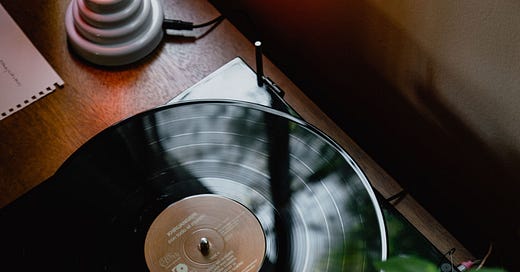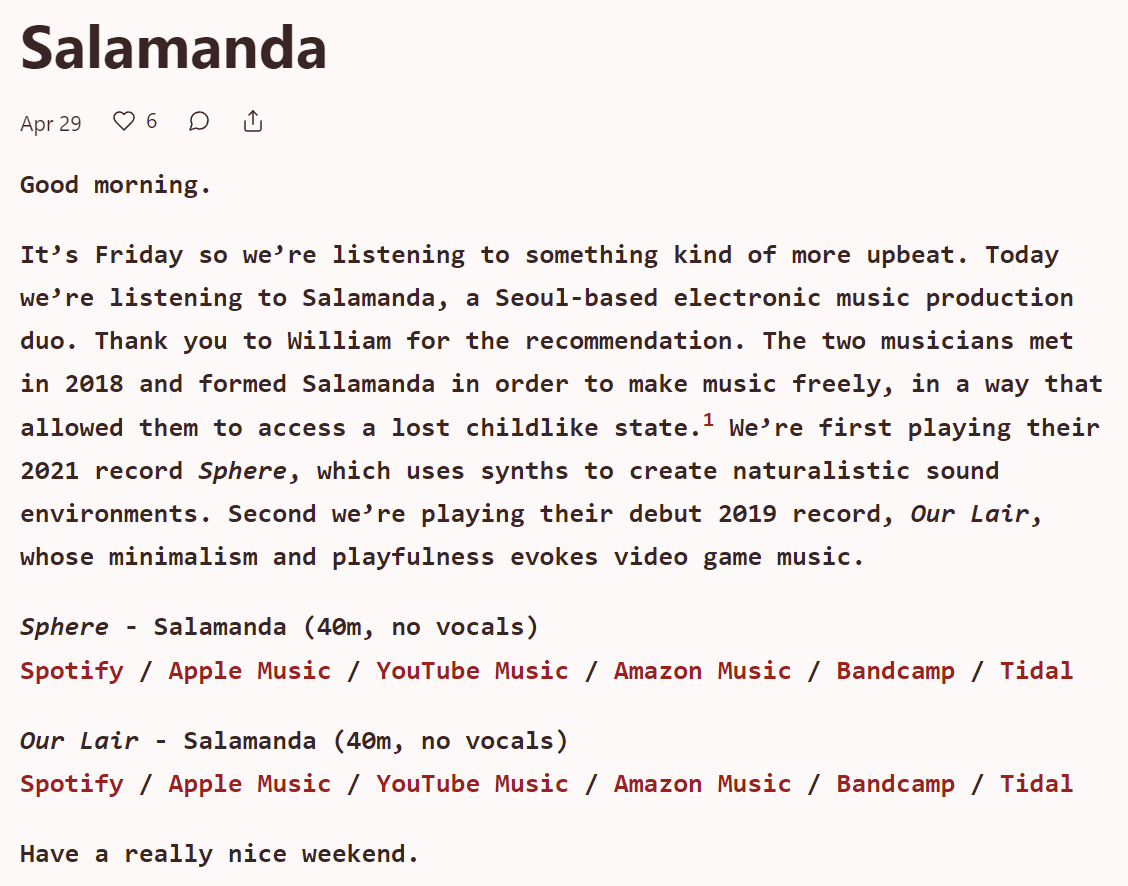tl;dr —
I’m in deep-end interest mode here about music, specifically albums. As is typical, I wrote way too much for you, so you’ll see offshoot pieces on taste and designs for recommender systems below. They’re related, but here I’ll focus on the album recommender I’m building.
You can sign up for albumrec by replying or DMing me, test it in lo-fi mode below, or tell me to go to grass1.
+ ILU.
Bren
Throughout April I’ve been building an album recommender tool using my Spotify data. I’m not that far along, but it’s cool enough to discuss.
I want to find new albums that I love that help me work in flow. I estimate 90% of my music listening is in album form, and I spend too much time searching for the next album.
Through this building process, I want to figure out why I love certain albums at certain times. In other words, I’m trying to understand and cultivate my taste.
If I can do this for myself, I can do it for you, too.
I’m going about this by rethinking what a recommendation system actually is. We often think of our Netflix and Google recommendations solely as algorithms, but what if we make our recommender human? What would it look like?
An expert, of course! Someone whose suggestions are perfect for us. They fit our taste, our current mood, and the surrounding context. They likely know a bit about us, too, like if we favor something familiar or brand new.
To understand how to actually replicate that, we have to think about how experts get their knowledge. And if that sounds like something I’ve studied, you’re right! My research covers synthesis — how experts form new concepts from different parts.
And that brings us to my goal. In short, I believe our tools should make us experts. A recommender is no different.
As mentioned, I wrote way more than I need to share in this piece. So, I’ll break this out into mini offshoots to pursue if you’re interested in how I think about cultivating taste and how recommender systems should help me synthesize why I love something.
Below I’ll just stick to the guts. Why albums, my progress, a mini test you can try today, and the prior art in this area.
Sound good?
Let’s roll.
Albums help me think
The album is my favorite method to listen to music. For an extended period in my day, I can take in the work of an artist from that moment in time. They share their passion and purpose and weave through the ranging emotions rattling around in their brain. I can feel their flow, their waves, their craft — all while I’m doing my work. It’s magical.
And honestly, it’s just easier to stay in flow when a similar sound is playing for ~30-60 minutes at a time.
Most days when I sit down to work, I put my headphones on and skim Spotify — what am I going to listen to today? If I’m being honest with myself, I probably spend 10-15 minutes a day on this, which makes me feel all sorts of ways.
So, I’m building an album recommender that has two goals:
Take my musical taste and present me with an album I should listen to right now, based on my mood and context.
Help me understand why I enjoy what I’m hearing, so I can find new albums that I like in the future.
The album could be new or old. I typically prefer to hear new music, which is based on my personality.
These italicized words double as key factors for how recommender engines actually perform most effectively (Tran, et al 2021). But we don’t want to stop there. Recommenders can be designed to go a level deeper and uncover new lines of thought within ourselves. 2
Thus, in time, the design of said recommender system plans to incorporate all of this through personal reflection.
Why?
Because we’re looking to cultivate taste. 3
Taste is typically unique to each of us, but that doesn’t mean we can’t have better taste in areas we spend more time in. Someone has great taste when they can recommend something — to the correct party — that they will enjoy.
Great taste correlates to expertise, so we also see that we can train our own taste to improve. Sommeliers have more advanced taste of wine than lay people like myself, but I can learn how they go about tasting wine. In time, and with the right people and tools to help me, I’ll pick up notes that help me articulate why I enjoy what I’m drinking. I may even become a sommelier myself! 4
In the case of our music listening, we’re looking to understand the elements we’re hearing and decompose them, so we can understand what makes albums great for us. In other words, we’re trying to become experts in listening to albums. If we do, we’ll acquire the expert’s shorthand, which we do through synthesis.
That’s where we’re aiming, but where are we today?
Building albumrec
As is typical in my project work, I’ve been bouncing ideas off my long-time collaborator Evan Meyer + getting help from great folks like Michael DeCero and Kevin Figenshu. It is abundantly safe to say I could not do this without you. Thank you all for the support. 🙌
Thus far, I’ve simply connected my Spotify history to a curated dataset and passed back a recommendation based on what I’m feeling lately. The program chooses from nearly 20,000 curated albums, records detailed sound factors about the album (tempo, key, loudness, etc.), and asks me what I think after I’ve listened.
This of course, is a simple model! There's nothing to it beyond my personal curation.
And that's the precise thing I'm aiming to do myself — figure out what I love about different albums. Thing is, the techniques I'm using on myself can be used to help you, too.
For now, I’ve spun up a small site to play around with. If you’re interested, DM me and I’ll share it with you in its early form in the coming weeks.
As I’m simply building atop the giants that have made this possible before me, the code will also be open sourced, in the case you want to continue to build onto this.
Let’s test this idea in lo-fi
In the meantime, here’s a slight taste of what you could expect, sans any interaction design. I’ve pulled three albums I use during my work sessions, each for different levels of excitement — which you can translate to mood.
To play along, listen to one of the albums below that corresponds with your state (high, medium, or low), and reply to this note with:
your feedback on a scale of:
0 - meh1 - this is fine
10 - wow, this is great
No in-betweens.
one sentence on what you liked about it.
That’s all.
High
Khruangbin — Con Todo El Mundo
2018 - 42 mins - neo-psychedelic (ha!)
Medium
Thom Yorke — ANIMA
2019 - 48 mins - electronic ambient rock
Low
Cat Power — The Greatest
2006 - 42 mins - indie folk
For context, I’ve tried to pull albums you’re more likely not to know, but will depend on your own history and taste. That said, I do believe I can find you new albums you’ll love, provided I can access your Spotify information.
Wrap it up
Any time I begin a new project, I ask myself why I’m doing it.
In this case, I can’t think of any direct monetary value I can gain from this, which lights me up inside. I’m doing this for fun!
The road to actually building this tool won’t be short, easy, or particularly steady. For one, I had to put down the coding this week as I worked to publish our research work, talked to a whole host of folks, and wrote this piece.
But there’s something novel here, at least for me, so I’m going to give it a shot.
I want to find new albums that I love.
I want to make the album the default way to take in the artist’s sound.
I want us to understand the sound we love and be able to translate it back to our friends.
I want us to develop the shared vocabulary of music lovers — their shorthand.
In other words, I want us to synthesize what we love about music.
And that's what I'm going to give a shot.
Because the album deserves it.
Reply or DM me if you want early access.
Appendix - Prior Art
A host of people have taken these challenges on already, so what makes me think I’m doing anything different and worthwhile?
Well, let’s look at some prior art.
On simple levels, we have Spotify’s recommendations built into the app, like this.

Yet, with each recommendation (I love Tribe), there’s no context! People deep in the recommender community (who, enjoyably hang out at places like this) call this a recsplanation — the compressed blurb that tells you why we think you’ll like this. There’s none of it from Spotify here. A total missed opportunity that I’ll add to the list of frustrations.
We can go further into the web with a variety of subreddits dedicated to album suggestions. Swaths of great records live in the pages within — just search! There, we get the context of the person’s listening history, details about the album and when they listen, and sometimes even their taste explained to us. This is good!
Critics lists and reviews are also a great resource, but again, there’s no action afterwards…just a learning experience.
Flow State deserves a special callout here. Each day, the fella in charge sends out a recommendation of an artist to listen to along with a background of why. This is as close as we get to understanding some of the background of the suggested music.
But, like most read-only solutions, it doesn’t go far enough to help me synthesize why I enjoy it.
I’m sure you can find other tools — my exploration drummed up a half dozen album recommenders. I’ve yet to see one that helps me understand the components of my taste, though.
Footnotes exist!
My grandma used to say that — ‘Go to grass!’. I was reminded of her phrasing this week — on her birthday, in fact. A nice memory and a funny phrase.
This is where you can read on about recommenders as synthesizers.
This is where you can read on about taste. There areome great quotes in here.
Okay, I probably won’t become a sommelier. I drink a fair amount of wine, and source it oh so well, but there’s a long way to go…





